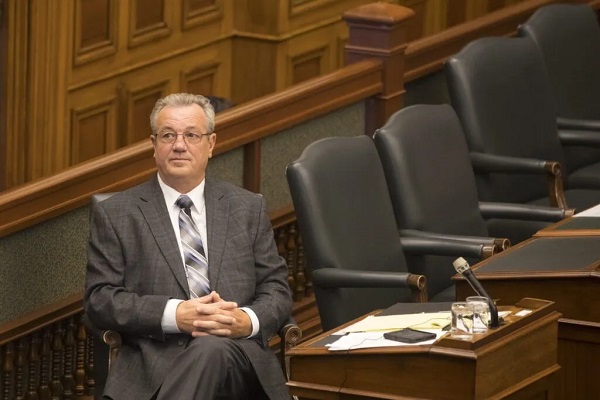Energy
Federal emissions cap a slap in the face to Indigenous peoples: Stephen Buffalo

From the MacDonald Laurier Institute
By Stephen Buffalo
We are sick and tired of being poor and welfare dependency. We have, particularly in the past 20 years, established hundreds of companies and partnerships and trained thousands of our people for work in the energy industry. Now the government is cutting our feet out from under us again.
It’s hard to remain quiet. Prime Minister Justin Trudeau has long said that relationship and reconciliation with Indigenous peoples is a top priority for his government.
And then he ignores us again. The Government of Canada is on the verge of doing it once more, this time on the emissions cap.
The government is preparing for COP28, the world climate event being held, seemingly without a touch of irony, in Dubai. The latest attempt at global attention grabbing is anticipated to be a reduction in greenhouse gas emissions which, in Western Canada, is a code for a sharp drop in authorized fossil fuel production.
Over the past four decades, Canadian governments urged and promoted Indigenous peoples to engage in the natural resource economy. We were anxious to break our dependence on government and, even more, to exercise our treaty and Indigenous rights to build our own economies. We jumped in with far more enthusiasm and commitment than most Canadians appreciate.
Well over 100 First Nations are substantially invested in oil and gas production as employees, employers, partners and equity participants. Dozens more have approved pipeline construction across their traditional lands. Many more have solid investments in oil and gas development and infrastructure. And we seek a greater and more meaningful role.
Of course, we do not support unchecked exploitation of natural resources. We insist on careful attention to environmental protection and remediation. And we expect and deserve fair compensation for the extraction of oil and gas from our lands. We are sick and tired of being poor and welfare dependency. We have, particularly in the past 20 years, established hundreds of companies and partnerships and trained thousands of our people for work in the energy industry.
Now the government is cutting our feet out from under us again. Over the past decade, Ottawa slowed pipeline development, passed legislation that hampered resource development, imposed increasingly strict controls on fossil fuel development, and created new levies and taxes to thwart our efforts.
They did all they could to shame the industry that, more than any other, sustains Canadian prosperity. Rapid population growth, manufacturing and urban sprawl, all major contributions to greenhouse gas emissions, have been largely untouched.
And now, in a bid to make Canada look ecologically virtuous on the world stage, the Liberal government is poised to impose further restrictions on the oil and gas sector. This is happening as Indigenous engagement, employment and equity investment is growing and at a time when our communities have had their first taste of real and sustainable prosperity since the newcomers killed off all the buffalo. Thanks for nothing.
We are astonished by Canada’s seemingly limited understanding of the role of oil and gas in Canadian prosperity. We get — and embrace — the concern about climate change and emissions. We support logical, collectively developed measures that will contribute to a reduction in Canada’s ecological impacts. But let us do this with our eyes wide open and by looking at all possible ways of meeting our climate targets. Norway gets little pushback for major expansions of its oil production; Canada, ever and undeservedly the global environmental doormat, takes intense criticism while operating one of the most environmentally sound and regulated energy sectors in the world.
All of Canada will pay a big price for our faux stewardship of the country’s remarkable energy resources. The federal government, wrestling with growing debt and staggering interest payments, collects billions annually in oil and gas revenues. The three western provinces contribute billions to federal equalization payments, with Quebec receiving the largest share.
But the western contribution earns little sympathy from Quebec, which stopped discussion of the Energy East pipeline in its tracks, closing off a new market for Canadian producers and retaining Eastern Canada’s dependence on imported oil. We are still waiting for a national “thank you” for access to the resources and the cash harvested from our oil and gas-rich lands.
It is fair to say that Canadians and the national government do not understand the seething anger building up in our communities. I know that I am not the only one who is truly upset. We followed government signals and found our feet economically in the past two decades. We created a space for ourselves in an industry that is fundamental to Canadian prosperity.
Indigenous people demonstrated their entrepreneurial skills and their ability to invest in both community development and long-term wealth creation keeping in mind both our present and future generations. The government seems willing to overturn our carefully won opportunities and prosperity, without the courtesy of full conversation acting as a colonial power.
Indigenous people have been betrayed many times over the last 200 years, but the most recent betrayals always hurt the most. We thought Canada had turned the corner in its respect for Indigenous peoples and our rights. Watch carefully over the next few days. If the prime minister talks about emissions controls, he really means production rollbacks. This is a slap in the face of Indigenous peoples.
Stephen Buffalo is a proud member of the Samson Cree Nation. He is president and CEO of the Indian Resources Council of Canada, chair of the board of directors of Alberta Indigenous Opportunities Corporation, a senior fellow at the MacDonald Laurier Institute, and the first ever Indigenous governor of the Canadian Energy Executive Association.
Daily Caller
AI Needs Natural Gas To Survive


From the Daily Caller News Foundation
By David Blackmon
As recent studies project a big rise in power generation demand from the big datacenters that are proliferating around the United States, the big question continues to focus in on what forms of generation will rise to meet the new demand. Most datacenters have plans to initially interconnect into local power grids, but the sheer magnitude of their energy needs threatens to outstrip the ability of grid managers to expand supply fast enough.
This hunger for more affordable, 24/7 baseload capacity is leading to a variety of proposed solutions, including President Donald Trump’s new executive orders focused on reviving the nation’s coal industry, scheduled to be signed Tuesday afternoon. But efforts to restart the permitting of new coal-fired power plants in the US will require additional policy changes, efforts which will take time and could ultimately fail. In the meantime, datacenter developers find themselves having to delay construction and completion dates until firm power supply can be secured.
Datacenters specific to AI technology require ever-increasing power loads. For instance, a single AI query can consume nearly ten times the power of a traditional internet search, and projections suggest that U.S. data center electricity consumption could double or even triple by 2030, rising from about 4-5% of total U.S. electricity today to as much as 9-12%. Globally, data centers could see usage climb from around 536 terawatt-hours (TWh) in 2025 to over 1,000 TWh by 2030. In January, a report from the American Security Project estimated that datacenters could consume about 12% of all U.S. power supply.
Obviously, the situation calls for innovative solutions. A pair of big players in the natural gas industry, Liberty Energy and Range Resources, announced on April 8 plans to diversify into the power generation business with the development of a major new natural gas power plant to be located in the Pittsburgh area. Partnering with Imperial Land Corporation (ILC), Liberty and Range will locate the major power generation plant in the Fort Cherry Development District, a Class A industrial park being developed by ILC.
“The strategic collaboration between Liberty, ILC, and Range will focus on a dedicated power generation facility tailored to meet the energy demands of data centers, industrial facilities, and other high-energy-use businesses in Pennsylvania,” the companies said in a joint release.
Plans for this new natural gas power project follows closely on the heels of the March 22 announcement for plans to transform the largest coal-fired power plant in Pennsylvania, the Homer City generating station, into a new gas-fired facility. The planned revitalized plant would house 7 natural gas turbines with a combined capacity of 4.5 GW, enough power 3 million homes.
Both the Homer City station and the Fort Cherry plant will use gas produced out of the Appalachia region’s massive Marcellus Shale formation, the most prolific gas basin in North America. But plans like these by gas companies to invest in their own products for power needs aren’t isolated to Pennsylvania.
In late January, big Permian Basin oil and gas producer Diamondback Energy told investors that it is seeking equity partners to develop a major gas-fired plan on its own acreage in the region. The facility would primarily supply electricity to data centers, which are expected to proliferate in Texas due to the AI boom, while also providing power for Diamondback’s own field operations. This dual-purpose approach could lower the company’s power costs and create a new revenue stream by selling excess electricity.
Prospects for expansion of gas generation in the U.S. received a big boost in January when GE Vernova announced plans for a $600 million expansion of its manufacturing capacity for gas turbines and other products in the U.S. GE Vernova is the main supplier of turbines for U.S. power generation needs. The company plans to build 37 gas power turbines in 2025, with a potential increase to over 70 by 2027, to meet rising energy demands.
The bottom line on these and other recent events is this: Natural gas is quickly becoming the power generation fuel of choice to feed the needs of the expanding datacenter industry through 2035, and potentially beyond. Given that reality, the smart thing to do for these and other companies in the natural gas business is to put down big bets on themselves.
David Blackmon is an energy writer and consultant based in Texas. He spent 40 years in the oil and gas business, where he specialized in public policy and communications.
Bjorn Lomborg
The stupidity of Net Zero | Bjorn Lomborg on how climate alarmism leads to economic crisis

From spiked on YouTube
Note: This interview is focused on Europe and the UK. It very much applies to Canada. The 2025 Federal Election which will see Canadians choose between a more common sense approach, and spending the next 4 years continuing down the path of pursuing “The Stupidity of Net Zero”.
European industry is in freefall, and Net Zero is to blame.
Here, climate economist Bjorn Lomborg – author of Best Things First and False Alarm – explains how panic over climate change is doing far more damage than climate change itself. Swapping cheap and dependable fossil fuels for unreliable and expensive renewables costs our economies trillions, but for little environmental gain, Lomborg says.
Plus, he tackles the myth of the ‘climate apocalypse’ and explains why there are more polar bears than ever.
Support spiked: https://www.spiked-online.com/support/
Sign up to spiked’s newsletters: https://www.spiked-online.com/newslet…
-

 Also Interesting2 days ago
Also Interesting2 days agoMortgage Mayhem: How Rising Interest Rates Are Squeezing Alberta Homeowners
-

 Alberta2 days ago
Alberta2 days agoAlberta takes big step towards shorter wait times and higher quality health care
-

 Justice2 days ago
Justice2 days agoCanadian government sued for forcing women to share spaces with ‘transgender’ male prisoners
-

 Business1 day ago
Business1 day agoStocks soar after Trump suspends tariffs
-

 COVID-191 day ago
COVID-191 day agoBiden Admin concealed report on earliest COVID cases from 2019
-

 MAiD2 days ago
MAiD2 days agoDisability rights panel calls out Canada, US states pushing euthanasia on sick patients
-

 COVID-192 days ago
COVID-192 days agoRandy Hillier wins appeal in Charter challenge to Covid lockdowns
-

 Business2 days ago
Business2 days agoTrump raises China tariffs to 125%, announces 90-day pause for countries who’ve reached out to negotiate




